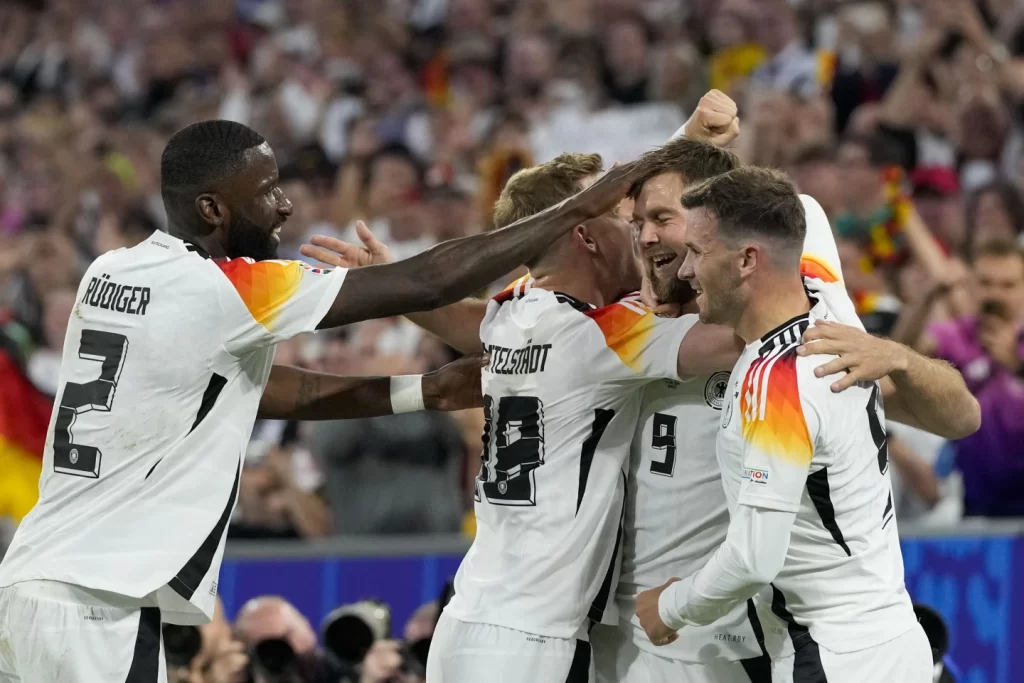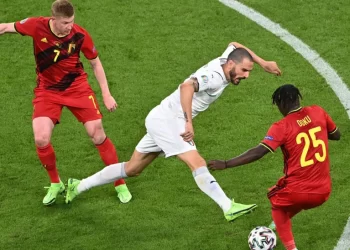
Germany's dominant 5-1 win over Scotland in Friday's Euro 2024 opener has home fans elated and vindicates coach Julian Nagelsmann's strategies.
In his role for less than a year, Nagelsmann's tactics were on full display, striking a balance for a team that has struggled on the big stage since their 2014 World Cup victory.
Germany's two opening goals highlighted elements of the team's past, present, and future. The first goal was created by a long pass from Toni Kroos, collected by Joshua Kimmich, who laid the ball on for Florian Wirtz to sidefoot home. For the second, captain Ilkay Gundogan threaded a delicate ball through the Scottish defense to Kai Havertz, who held up the ball and found Jamal Musiala, unleashing a shot into the top of the net.
"We couldn't have had a better start. We've seen the atmosphere in the country, and we need that," Musiala said of Germany's lightning start.
Pre-tournament expectations for Germany were modest after their last three major tournament exits. However, they have opened with their biggest victory in Euros history. They dominated the first half, which ended poorly for Scotland when defender Ryan Porteous was sent off and Kai Havertz converted the resulting penalty kick. Substitutes Niclas Füllkrug and Emre Can added to Scotland's misery after the break.
“The first 20 minutes were very impressive. The first goals were very good," Germany coach Julian Nagelsmann said. "It’s very valuable that many players performed well early on. It was only the first step but a very good one, and we can build on this one. We’re very happy.”
Scotland, which hadn't had a shot on goal all match, managed to give its fans something to cheer about late on when the ball was bundled into the back of the net off Germany defender Antonio Rüdiger for an own goal.
Steve Clarke’s side will need to improve against Hungary and Switzerland if they are to advance from Group A and reach the knockout stage for the first time.
“Difficult night. We didn’t play to our standard. The German team were excellent,” Clarke said. “We feel as though we’ve let ourselves down. We’re better than that. Hopefully we can show that the next two games.”
Scotland’s Tartan Army of supporters started the match in fine voice but were swiftly quieted when Wirtz scored in the 10th minute. Toni Kroos picked out Joshua Kimmich with a brilliant crossfield lob, and he rolled it across for Wirtz to fire in. Wirtz became Germany’s youngest Euros goal-scorer at 21. Musiala, 67 days older than Wirtz, doubled Germany’s tally nine minutes later after combining well with Havertz.
Right on halftime, Scotland goalkeeper Angus Gunn only parried a header from Gündoğan, but just when the captain appeared set to tuck home the rebound, he was upended by a challenge from Porteous. Referee Clément Turpin showed Porteous a straight red card and awarded Germany a penalty, which Havertz converted.
Scotland managed to hold out in the second half until an attempted exchange between Musiala and Gündoğan fell kindly for Füllkrug. The substitute, who had been on the pitch for only five minutes, unleashed a thunderbolt into the top right corner. Scotland's late consolation came when Kieran McKenna’s header from a free kick deflected off Rüdiger.
Still, Scotland conceded five goals for the first time in 12 years when Can, who was brought into the squad only two days ago as a replacement for the ill Aleksandar Pavlovic, curled in during stoppage time.
“A great feeling and a crazy story ... I was on vacation two days ago,” Can told ZDF. “Then the call came on Wednesday, and on Wednesday evening I met up with the team, trained once yesterday, came in today (off the bench), scored a goal. I’m thankful to Julian (Nagelsmann) and the whole coaching staff for their trust in me.”
Late German soccer great Franz Beckenbauer was honored before the match, and the capacity crowd included German President Frank-Walter Steinmeier, Scotland First Minister John Swinney, and Hungarian Prime Minister Viktor Orbán.
Germany next faces Hungary on Wednesday, while Scotland takes on Switzerland.



















